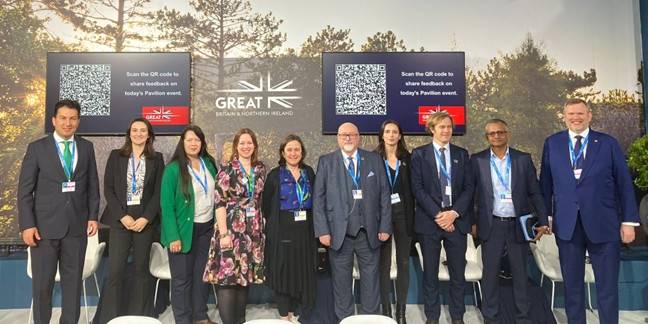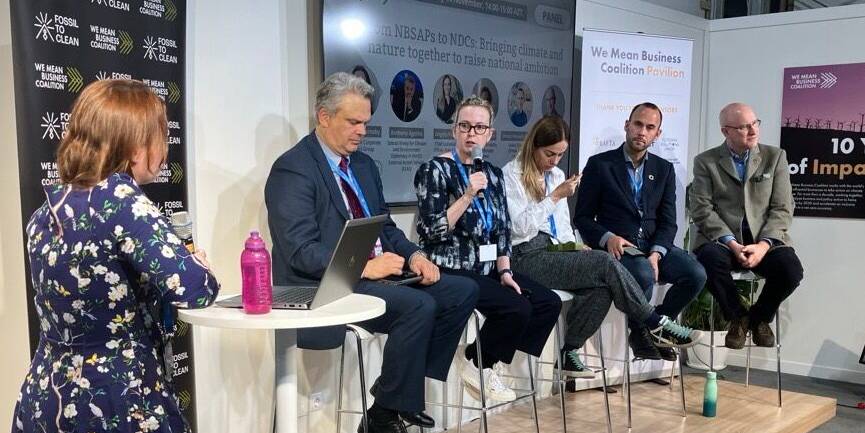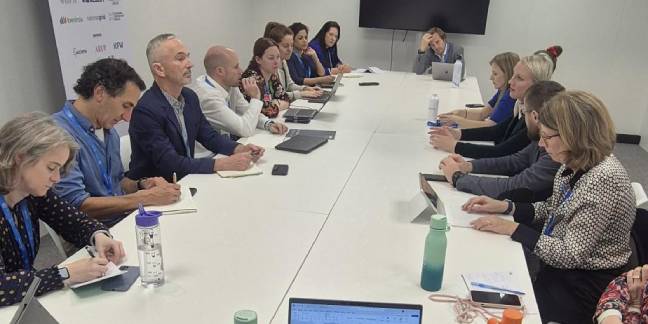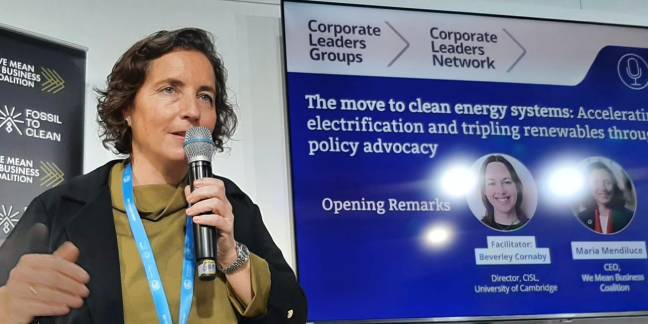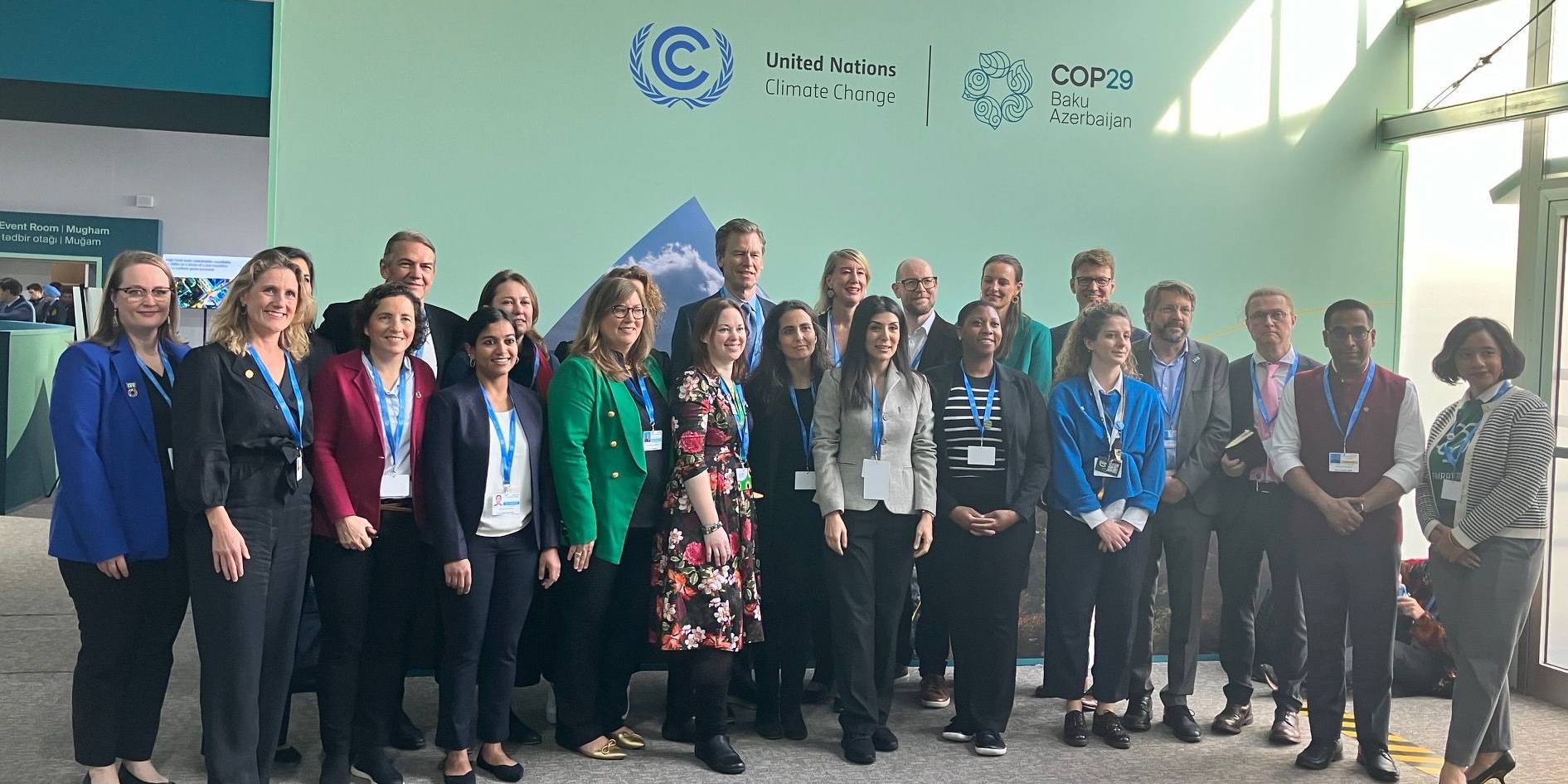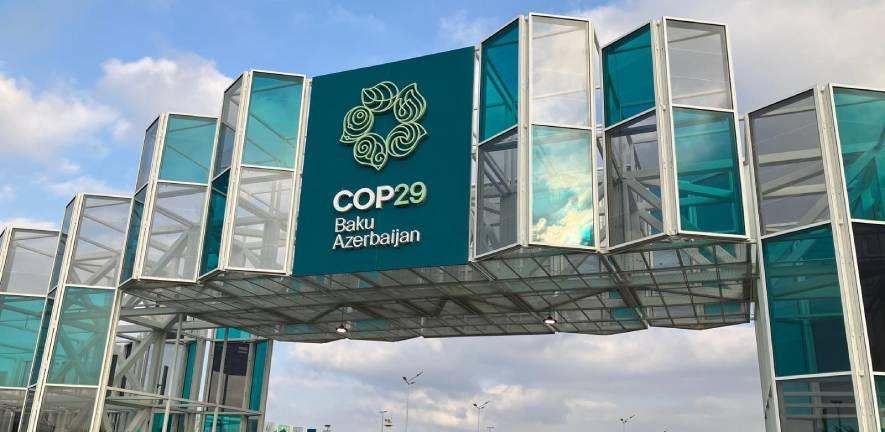
03 December 2024 - As an official sponsor of the UK's COP29 and COP30 Pavilion, the UK Corporate Leaders Group (CLG UK) increased its presence and visibility at this year’s UN climate convention leading many high-level events, convening cross-sectoral experts and forging stronger business-government engagement.
Since its founding in 2005, CLG UK has helped build consensus across the UK business community in support of climate action. The leadership group spoke first and loudest in support of the UK’s Climate Change Act – and hasn’t stopped since, now sitting at the heart of a growing community of progressive business voices, which it also brings to important international moments, such as the UNFCCC COP.
CLG UK sponsored COP29’s UK Pavilion
Despite its surrounding narrative, COP29 in Baku, Azerbaijan, was a significant moment that could not be underestimated in its importance. Recognising this, CLG UK entered into a two-year co-sponsorship deal of the UK government’s Pavilion in the conference’s Blue Zone, with the kind support of its business member, Unilever.
CLG UK Director, Bev Cornaby, says, “CLG UK is perfectly positioned to work with the UK Pavilion’s partners, businesses and change-makers to mobilise investment, technology and innovation to achieve our shared goals. We must work together to unlock the power of UK leadership, shift markets and economies, and maintain ambition for climate, nature and people.”
The partnership allowed CLG UK to highlight business leadership and push for ambition and climate action at this year’s COP29 through its flagship event at the Pavilion, as well as contributing to other high-profile events, showcasing its work and that of its members on screens, as well as engaging with government figures. The sponsorship supports the UK in restoring its position as a global climate leader in the net-zero transition, working with UK government up to, including, and beyond 2025’s COP30 in Belem, Brazil.
Welcoming the UK government’s ambitions plans
Leading up to COP29, CLG UK called on the UK government to set an ambitious and investable 2035 Nationally Determined Contribution (NDC) through a business sign-on letter as well as its latest policy briefing ‘Making it happen’. In support of the We Mean Business Coalition's NDC campaign, CLG UK pushed this call to action at COP29 for all countries to set ambitious and investable NDCs for 2035. These need to be supported by clear, consistent, long-term climate transition plans that also outline how they will meet existing 2030 targets The announcement in week one from the UK government of an 81% reduction in greenhouse gas emissions, based on 1990 levels, was globally praised as putting the UK back at the table for strong, climate leadership and endorsed by CLG UK.
The launch of the new Global Clean Power Alliance by Prime Minister Keir Starmer at the G20 in Rio de Janeiro, in the middle of COP29, was also welcomed, with Bev Cornaby saying, “The new Global Clean Power Alliance launched by the UK is aimed at helping the countries most at risk of being left behind in their own energy transition through unlocking finance and access to the technology they need. In delivering its own clean power by 2030 mission, the UK is now taking a lead in supporting the global transition."
Working with the Department for Energy Security and Net Zero and UK government
Throughout COP29, CLG UK co-chaired multiple business briefings with DESNZ, convening businesses to give updates on DESNZ outputs and discuss ways to drive progress.
Bev Cornaby joined Secretary of State for Energy Security and Net Zero, Ed Miliband, at an exclusive roundtable to discuss how the UK leads on global climate action, delivering the opening and closing reflections. She also had private conversations with Foreign Secretary, David Lammy MP; Financial Secretary to the Treasury, Lord Livermore; HE Fergus Auld, UK Ambassador to the Republic of Azerbaijan; and Chris Stark, Head of Mission Control for Clean Power 2030. Additionally, Bev delivered the opening keynote marking COP29’s half-way point at an event with the British Chamber of Commerce.
Viola Meyerweissflog, CLG UK’s Deputy, had discussions with The Rt Hon Douglas Alexander MP, Minister of State (Minister for Trade Policy and Economic Security); The Rt Hon Kerry McCarthy MP, Parliamentary Under-Secretary of State (Minister for Climate); The Rt Hon the Lord Alok Sharma; and Lee McDonough, Director General, Net Zero, Nuclear and International at DESNZ. Viola was involved in further conversations with the HE Fergus Auld, as well as the new Chief Executive of the Climate Change Committee, Emma Pinchbeck.
CLG UK events round-up
Discover the key takeaways from CLG UK-hosted events within the Blue Zone at COP29.
Flagship event at UK Pavilion: Empowering Impact-Makers: How SMEs Drive Innovation in Sustainable Business Practice.
If small and medium enterprises (SMEs) make up 95% of businesses and 50-60% of jobs globally, why aren’t they included more in the pathway discussions to net zero, particularly in supply chain issues? This question, as well as attempting to resolve this disparity with practical solutions to overcome barriers, was discussed at CLG UK’s open roundtable at the UK Pavilion, on Human Capital, Children and Youth, Health and Education Day.
It convened experts from global businesses, chambers of commerce, COP29 Azerbaijan representatives, as well as all-important SMEs themselves. Noemi Florea, Founder and Director of LÆRO an SME whose leading venture, Cycleau, offers a point-of-use water treatment and wastewater recycling system, gave her invaluable insights on the discussion of how SMEs can actively contribute to systems change.
Key takeaways:
- SMEs are on the front line of climate change, so those in the position to offer support must do so and ensure the conversation of support then becomes a platform for action. “Starting an SME, is like climbing Mount Everest in flip-flops,” suggested Orkhan Mustafayev, Senior Advisor, Business Engagement, COP29 Azerbaijan.
- Traditional banking systems still look at scale before allocating any investment, therefore this must be looked at to encourage capacity building. Any subsidies, tax credits etc must be designed with SMEs in mind.
- Don't underestimate the role SMEs can play in public community and civil society. They can be champions for growing knowledge and getting the climate and nature crises messages out there.
- Policy-makers oftentimes need evidence to ensure policy development. If SMEs don’t have access to large-scale tracking, they can aim to use the distribution pathways of larger multinationals to catalyse solution-based changes.
- The growth of SMEs, particularly in the development of clean tech is a huge economic opportunity, and it’s important that governments around the world can talk about the benefit to local economy of these projects. And then once established, they need to be manufactured in developing countries.
- Find the tools available to offer support when it’s needed: the High-Level Champions’ Race to Zero Climate-Proofing SME Hub and the SME Net-Zero Standards Hub from the British Standards Institute offers free guidance and resources.
Watch the recording of the session here.
From NBSAPs to NDCs: bringing climate and nature together to raise national ambition.
The CLG UK event at the end of week 1 convened a group of experts to discuss the intersection between climate and nature in its panel discussion ‘From NBSAPs to NDCs'. Business is waking up to the challenge of including nature in risk calculations and action plans. But there is still a long way to go.
COP16 in Cali, Colombia, which wrapped up in October 2024, ended without all countries submitting their National Biodiversity Strategies and Action Plans (NBSAPs) and without a conclusive outcome. International moments must be seen holistically, better integrating climate and nature at a national and international level.
This was discussed by Tony Agotha, Special Envoy for Climate and Diplomacy, European External Action Service; Fiona Duggan, Global Sustainability Senior Manager, Unilever; Simon Henzell-Thomas, Global Director Climate & Nature, Ingka Group (IKEA); Stuart Brocklehurst, Deputy Vice-Chancellor for Business Engagement and Innovation, University of Exeter; and Angela Pinhati, Chief Sustainability Officer, Natura &Co.
Key takeaways:
- We need to speak in terms that people understand, especially in terms of health – it’s about us and our children, our health and wellbeing. And one of the most important things is that we recognise that link and create that awareness.
- But nature is misunderstood. Everything we rely on is nature, but people tend to only think of species loss rather than biodiversity loss. Something must be done to get the nature narrative understood better.
- What's needed to happen between COP29 and COP30? “Money, money, money,” said Henzell-Thomas. “We haven’t had a breakthrough on this yet. And we need an effective working finance mechanism else we won’t be able to reach our goals.”
- The financing debate was a challenging one at COP16 in Cali, Colombia, and the conversation on nature is further behind than climate. “The outcome from COP16 was woeful,” suggested Brocklehurst. “The lack of submitted NBSAPs and national commitments was disappointing, and we cannot let this happen again. COP16 is a warning to COP29.”
That said, some big businesses – Unilever included – have pushed for NDCs to be integrated with NBSAPs, as it understands that biodiversity loss is an emerging risk for its business. Therefore, its climate action plan now has both nature and climate targets.
Watch the recording of the session here.
Business and Climate Advisory Bodies: Strengthening Global Engagement for Accelerated Climate Action
The roundtable explored the critical role of business engagement with national and international climate advisory bodies in advancing effective climate policies and achieving global climate targets. The session brought together key stakeholders from business, climate advisory bodies, including the UK’s Climate Change Committee, and a variety of international counterparts organised in the International Climate Councils Network (ICCN), to discuss best practices, challenges, and opportunities for collaboration.
The move to clean energy systems: accelerating electrification and tripling renewables through business policy advocacy.
CLG UK and its sister-group, the European Corporate Leaders Group (CLG Europe), joined with CISL’s Corporate Leaders Network (CLN) to host an informative panel on the move to clean energy systems on the UN climate conference's Energy Day.
Facilitated by Bev Cornaby and Tsvetelina Kuzmanova from CLG Europe, the event welcomed a roster of experts from across business and policy-making, ensuring that key collaborations and discussions happen not just in the plenary rooms but in the pavilions, too. It concluded with a special fireside chat with Chris Stark, Head of Mission Control for Clean Power 2030, who described the UK's ambitious NDC announcement of 81% earlier in the week as a "genuine sign of leadership".
Key spokespeople and their takeaways:
- María Mendiluce, CEO, We Mean Business Coalition urged businesses to rally around its Fossil to Clean campaign and to push for fossil-fuel phaseout alongside tripling renewables and doubling energy efficiency.
- Aoife Blanchard, Project Manager at CISL, presented the CLN’s #MoreRenewables campaign asks, highlighting that robust laws are a crucial enabler for tripling renewable energy capacity by 2030.
- Gonzalo Saenz de Miera, Director of Climate Change and Alliances, Iberdrola, emphasised the importance of investing in grid networks as well as renewables and expressed high hopes for the EU’s Green Industrial Deal.
- Matt Hinde, Head of EU Affairs, National Grid, highlighted that "without transmission, there is no transition" and echoed the CLN’s call for harmonisation of laws across regions to unlock more renewables.
- Simon Henzell-Thomas,Global Director Climate & Nature, Ingka Group (IKEA), announced that IKEA will invest €1.5billion as part of its renewable energy transformation. He highlighted permitting as the biggest challenge for IKEA and said that companies are asking for regulation and policy certainty.
- Jan Dusík, Deputy Director, DG CLIMA, said that the new European Commission is very clear on its course with 90% emissions reductions by 2040 proposed, and plans to release the new Green Industrial Deal in its first 100 days, also emphasising the importance of competitiveness and business buy-in.
- Chris Stark provided closing reflections on how the UK can get to clean power by 2030, expressing hope for the next offshore wind auction and declaring that the UK has enough projects in the pipeline to get to clean power. It’s now about prioritising them and focussing on delivery.
- Both Chris and Jan received CLN’s business letter calling for urgent action to enable the renewable energy transition.
Watch the recording of the session here.
High-Level Champions’ Race to Zero Climate-Proofing SME Hub Roundtable.
On Science, Technology and Innovation Day, the UN High-Level Climate Champion of the COP29 Presidency, Nigar Arpadarai, hosted a roundtable for the SME Climate Hub and Race to Zero Climate-Proofing SME campaign. CLG UK Director Bev Cornaby joined Cambridge Zero Deputy Director, Stephen Davison; Eldrid Herrington, Head of Academic Engagement at University of Cambridge's Hughes Hall; We Mean Business Coalition CEO María Mendiluce, alongside other representatives from business, finance, governments and policymakers to discuss how stakeholders can empower and enable small and medium-sized enterprises' (SME) climate action.
Key takeaways:
- Increased access to finance and capacity building is needed for SMEs to progress at the scale needed and overcome the finance and skills gap.
- When leadership comes from the ground, it is a force to be reckoned with, therefore it’s imperative for SMEs to be integrated in all aspects of the journey from COP29 in Baku to COP30 in Belem, Brazil.
- Established businesses need to make language accessible for SMEs to take action.


